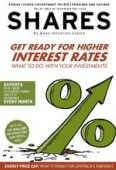Archived article
Please note that tax, investment, pension and ISA rules can change and the information and any views contained in this article may now be inaccurate.
Should fund managers always meet investee companies?

For ‘bottom-up’ stock pickers, face-to-face meetings with company management can be the key to obtaining a competitive investment edge. Other professional fund managers, however, prefer to pore over annual reports and undertake forensic analysis of the profit and loss account and balance sheet. By investing purely on the fundamentals, they seek to avoid allowing management teams led by skilled presenters to skew their investment thinking.
Kissing frogs aplenty
Wearing out the shoe leather to visit management on-site, or setting aside time to host executives in-house, is part and parcel of most professional money managers’ jobs.
‘We kiss a lot of frogs,’ says Ben Rogoff, manager of the Polar Capital Technology Trust (PCT), who says his investment team meets more than 1,000 companies every year. Fraser Elms of Herald Investment Management is even busier, saying the Herald team (which includes star fund manager Katie Potts) talks face-to-face with 1,500 companies a year, on average.
James Milne of Crux Asset Management, the group behind the FP CRUX European (GB00BYQJX435) and FP CRUX European Special Situations (GB00BTJRPW12) funds, is also a fan of meetings. He comments: ‘Because the annual report is read by competitors, suppliers and customers, management are wary of revealing too much to investors because they are aware other people are reading it as well. When you meet the management, they can help you complete the story. Often company statements don’t explain in plain English the background of the company and what it is trying to achieve.’
Milne adds: ‘If you meet the CEO and CFO you get to eyeball them and see what type of person they are, get them to explain their background, where they come from, what experience they have and how they have created value elsewhere.’
He explains that by meeting management teams from several companies in the same sector you can also get a feel for the industry background. ‘It’s good to check from the horse’s mouth if analysts are correct in their growth assumptions and to get an insight into where the company is going to be investing its cash.
‘I know some people in my peer group say you can never trust management, that they lie. Management are always going to be positive on their stock but I would struggle to think of an example where management have lied.’
Mark Slater, the star manager behind the Slater Growth Fund (GB00B0706C66), likes to meet management teams ideally at the end of the selection process. ‘The rationale is that we prefer to know a lot about a business when we meet management so that we can focus on the questions we want answered. The risk in meeting earlier in the process is that you can end up giving undue weight to what management says about near term trading and lose sight of the big picture regarding the long term prospects of the business.’
Working closely
When it comes to micro-caps, often led by founder CEOs, meeting management is an essential part of the due diligence process for Downing Strategic Micro-Cap Investment Trust (DSM). Seeking to generate long term capital growth through a concentrated portfolio, Downing prefers to take an influential, strategic position in each micro-cap of between 3% and 25%.
Interestingly, Downing’s Public Equity team applies a private equity style approach to investing, visiting potential investee companies, proactively engaging and working alongside aligned management teams to drive returns.
One indefatigable fund manager who puts in the hard yards is Charles Jillings, director and chief executive of ICM, the manager of Utilico Emerging Markets (UEM), an investor in cash generative infrastructure and utility assets. These span ports, toll roads and airports to power, water and waste and communications assets in developing markets ranging from China and Brazil to Chile, Mexico, Malaysia and the Philippines. ‘We’re bottom-up investors and we’re looking for outstanding value,’ explains Jillings, whose fund currently trades at an 11.7% discount to net asset value that could interest growth and income seekers.
Crucially, ICM’s dedicated team of analysts visit every single one of UEM’s investments, regularly fanning out to Asia, Latin America, Eastern Europe and the Middle East in their quest for companies and sectors displaying the characteristics of essential services or monopolies with a unique product or market position.
Seeking companies with compelling long-term business models that also operate in dynamic economies undergoing urbanisation and with a growing middle class, Jillings says the third piece is management. ‘A company can be growing its top line, but if management can’t control the cost base, you’ll find margins erode and shareholder value is undermined.’
He continues: ‘We’re driven by the need to see the asset and understand the management. If it is a port, we want to see the port even if it means a day’s journey or two. We gain access to management because people see that if we’re persuaded, we’ll make an investment. If we can’t get comfortable with management, if we have to second guess, we’d rather be out.’ Keep your distance
Keep your distance
Jeremy Lang, partner and co-founder of Ardevora Asset Management, has a very different approach. ‘Our approach to investing is fundamental. We are stock pickers. We look at many of the same things as other fundamental investors, but we think we do it in a slightly different way. Like most investors we aim to invest in well managed, low risk businesses. But, unlike most, we think the best way to do this is to take the results of academic research from cognitive psychology, on errors and biases, and apply them to financial markets.’
Ardevora believes successful stock picking requires an understanding of how company managers, financial analysts and investors interact. ‘Each group is potentially subject to bias, and the biases affecting each group are different,’ continues Lang.
‘Cognitive psychology tells us that company managers, despite being intelligent and well informed, are especially susceptible to over-confidence bias. We take the view that, all things being equal, management are likely to push a business harder than is sensible. This is driven by their self-belief, their shareholders’ desire for growth and their companies’ remuneration policies.’
The important factors
To get a sense of whether a company is being run in a sensible way, Ardevora examines how fast the company is growing, how much cash is being generated and what management says about their business and current industry conditions. This all helps Ardevora make a judgement on management’s attitude to risk.
‘If we think a company is straining too hard for growth or in denial about how difficult conditions are becoming we will not buy the stock. Instead of meeting with management, we prefer to keep a safe distance, judging them instead by observable facts.’
Once Ardevora has identified those well managed companies, it applies the same lessons from cognitive psychology to financial analysts and investors to find mispriced stocks. ‘In our view, financial analysts can often under-appreciate how fast, and for how long, unusual businesses can grow, especially relative to superficially similar businesses. By exploiting this tendency we hope to identify interesting growth stocks.’
Lang also says that separately, investors can often become sceptical and nervous about companies after a traumatic event. By exploiting this tendency, Ardevora hopes to identify interesting value stocks. ‘When we have identified a group of companies which we believe are being well managed, and there is something interesting going on in the way financial analysts or investors are viewing these companies, we aim to construct a well balanced portfolio which allows our focus on stocks to add value. All stocks are equally weighted. As with our children, we believe it is better not to have favourites.’
Lending her view is Samantha Gleave, co-manager on a number of Liontrust funds including Liontrust European Growth (GB00B7T92B14). ‘Quite often company managers provide forecasts of future profitability and these can be unreliable and, at times, misleading,’ Gleave explains. ‘Rather than meet with company management, our investment process is instead based on forensic analysis of companies’ financial statements.’
Liontrust’s analysis suggests this is a superior approach because of the difficulty company managers and investors have in forecasting the road ahead. ‘We think investors often place too much emphasis on the ability of individuals to make forecasts despite a wide body of academic literature that affirms none of us are very good at it,’ says Gleave.
‘Investors’ focus on these profit forecasts results in the mispricing of shares and provides us with a consistent opportunity to add alpha. In our opinion, historical analysis of company cash flows is a far more reliable guide to future profitability and stock price valuation in the medium term. We believe that companies run by conservative managers focused on, and delivering, cash flow will perform significantly better than companies run by aggressive company managers making large cash investments today in order to chase forecast future earnings growth.’
Important information:
These articles are provided by Shares magazine which is published by AJ Bell Media, a part of AJ Bell. Shares is not written by AJ Bell.
Shares is provided for your general information and use and is not a personal recommendation to invest. It is not intended to be relied upon by you in making or not making any investment decisions. The investments referred to in these articles will not be suitable for all investors. If in doubt please seek appropriate independent financial advice.
Investors acting on the information in these articles do so at their own risk and AJ Bell Media and its staff do not accept liability for losses suffered by investors as a result of their investment decisions.
Issue contents
Big News
- Streamlined BAE aims to fly
- Capita announces new CEO
- Online orders heat up Domino’s shares
- Can exploration make a comeback after North Sea oil discovery?
- Where next for the UK stock market?
- Energy price cap threatens Centrica’s earnings and dividend
- Polar launches new megatrends fund
- Christmas comes early for Cranswick

 magazine
magazine











